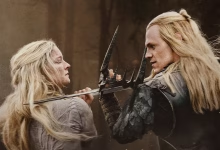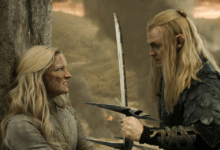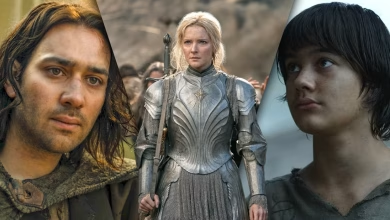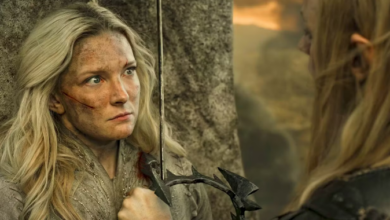LOTR: Rings of Power Deserves a Third Season
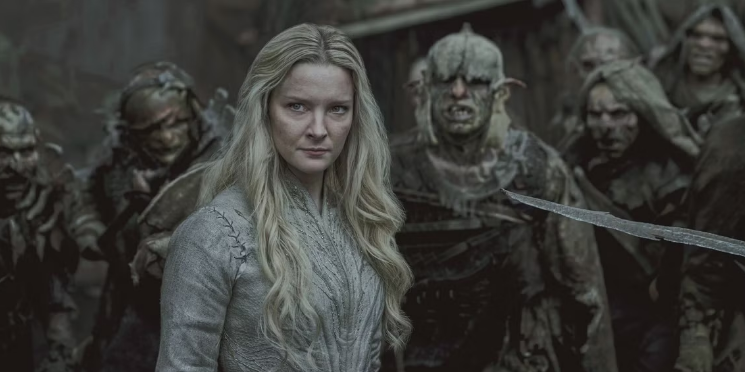
The Lord of the Rings: The Rings of Power just concluded its second season on Amazon Prime. The season finale, EP8, “Shadow and Flame” sent the second season of the fantasy series out on a dramatic high note, that leaves its sizeable cast of characters all at critical points not only in the history of the second age, but in their lives as beings of Middle Earth. The second installment of Rings of Power was an improvement on all fronts; pushing the high standard set by the first season’s ambitious sense of pacing and world-building, while infusing a genuine core of profound darkness at the center of its narrative.
In some ways, the formula established in season one has remained intact. As it was in the first season, we still follow multiple ongoing narratives and character groups, all taking place simultaneously across the vast realm of Middle Earth, and sometimes beyond. Nori, Poppy, and the stranger are wandering through the land of Rhun in search of his greater purpose. Things take a turn for the worse in Khazad-dûm as a ring of power drives the deep emotional fissure between prince Durin IV and his father king Durin III even deeper, the kingdom of Númenor continues to rapidly fall apart, Galadriel is battling hordes of Adar’s forces on her path to defeating Sauron, and composer Bear McCreary’s music remains stupendous throughout, just to name a few key elements that carried over meaningfully from season one to the new batch of hour-long episodes.
Season 2 also strikes a definitively darker tone. Showrunners J.D. Payne and Patrick Mckay have referred to it as “The Villain Season”. Crucilly because season two revolves around the story of how Sauron, aka Annatar, harnessed all of his guile, deceitful charm, and supernatural powers of manipulation, in order to coerce Celebrimbor and the Elven smiths of Eregion, into forging the nine remaining rings of power for him. In season two, we get to witness exactly how the dark lord of Mordor managed to steer the very fate of Middle Earth towards his own dark will to dominate all life, through a keen mixture of sharp psychological warfare and good old-fashioned gaslighting.
Despite also working on a significantly wider narrative canvas, season two of Rings of Power goes into even deeper dramatic territory than its predecessor. The fuel that propels the engine of season two are its various meaty, dramatic storylines. All across Middle Earth, the Shadow is rising and the destructive power of the rings is beginning to take root. With so many major storylines in progress by season’s end, a third installment (and hopefully a few seasons beyond) of Rings, simply must happen.
What May Come To Pass
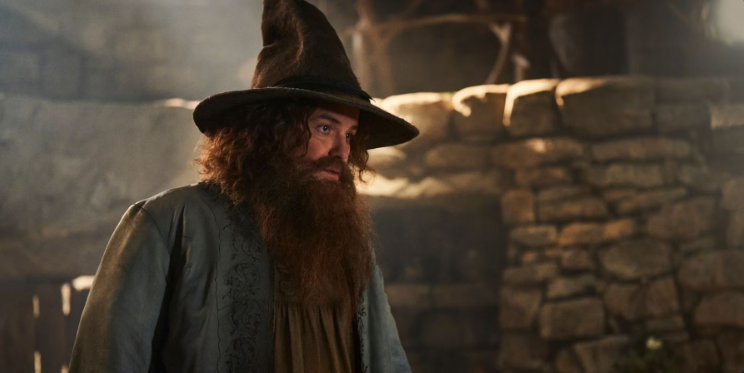
Celebrimbor: Celebrimbor shone as a character throughout season two. Sadly, in the end, he was forced to give his life heroically, while protecting the nine rings of men from Sauron’s grasp to the bitter end (an incredible scene). Later, Sauron takes the shape of the deceased elven smith during his battle with Galadriel. Could this brief moment possibly be introducing some Middle Earth: Shadow of Mordor influence? ; i.e. hellbent Even for a show which sometimes plays fast and loose with canon, the idea of Celebrimbor returning as a vengeful spirit seems unlikely. But, Sauron’s powers of mimicry (effectively Middle Earth’s Mystique) could conjure the essence of the Eregions’s greatest smith’s, at the very least.
Sauron and Galadriel:Sauron has offered to make Galadriel queen of Middle Earth not once but twice in the first two seasons of Rings of Power. He is instinctively drawn to absolute power and pure beauty; two qualities that Galadriel, at least externally, appears to have in spades. But the undeniable pull he feels to her is far from a one-sided feeling. In fact, it isn’t until we actually hear Galadriel tell Sauron definitively, “The door is shut” during their climactic swashbuckling duel in episode 8, that we as the audience feel confident that she is free from his darkly seductive influence. Even in their final showdown, rather than killing her (which he has ample opportunity to do), the great deceiver instead stabs Galdriel with Morgoth’s crown, inflicting the same wound he suffered at the hands of Adar at the outset of season two. In Sauron’s mind he still sees Galadriel taking her place upon the dark throne he envisions for her; a future she forsees herself at the mirror of Galadriel in The Fellowship of the Ring.
The Fall of Númenor: The fall of the great kingdom of Númenor has officially begun by the end of season two. Elendil parts ways with Queen Tar-Míriel and rides to the convent of faithful Númenorians on the west side of the island nation. But before he leaves, the queen gifts him the legendary Blade of Narsil the flame of the west, which Isilidur will eventually use to cut the ring from Sauron’s finger. Meanwhile, Elendil’s daughter Earien stays beside the Machiavellian Ar-Pharazon, while his son Isilidur sails for the shores of Númenor, unaware of the dire straits that he will find in his homeland in upon his return. Frankly, at times, characters in this storyline, like the often frustrating Earien, or the downright insufferrable Kemen, are often harder to root for then Sauron himself, who is so emanates equal parts charm, mystery and menace. But the events that this arc are heading towards will be well worth the payoff if we ever get to see them rendered properly on the big screen.
Nori and the Harfoots: At the end of season two, Nori and the Stranger finally part ways. She leaves him, departing on her own, separate from Poppy and the rest of the Stoors (who are Sméagol’s ancestors canonically). Naturally, with a name like Elanor Brandyfoot, one would imagine that she must have some influence over the future lands that would be called the shire. While it would certainly be fun to see the formation of the shire, seeing the construction of a quiet agricultural community filled with good-natured hobbits, does seem a little challenging to dramatize. However, it could certainly make for a wonderful DIY house-building reality show, Middle-Earth-style.
The Elves: Narvi tells Durin IV that, in the aftermath of Eregion, the Elves, including Elrond and Galadriel, have fled to a valley north of Khazad-dûm; presumably Rivendell though they never say so for sure. The final shot of season two is a triumphant image of the high king Gil-Galaad standing atop the valley raising his sword, symbolically telling his fellow elves, in the words of another great king, “Let’s hunt some orc”.
Khazad-dûm: Though King Durin IV annointed his son the new King before giving his life fighting the Balrog, the succession was never officially carried out, and thus other forces are now vying for the throne of Khazad-dûm. The field, according to Narvi, includes Durin’s Brother, who the show does not name explicitly, and several challengers from the blue mountains, who are the direct ancestors of Thorin Oakenshield, and therefore bound to be stiff competition for Durin and Disa. The massive cavern of Mithril veins that the late king uncovers are the beginning of the end of the Durin legacy. As Saruman says in Fellowship of the Ring, “The dwarves delved too greedily and too deep. You know what they awoke in the darkness of Khazad-dûm… shadow and flame”. In season three, we would finally get to see exactly what he meant by that.
Elrond: It is a given that the lore will not always match up perfectly to the events portrayed in Peter Jackson’s trilogy. That being said the question of why Elrond’s overall opinion on Dwarves seems to have soured by the time he speaks to Gandalf in Rivendell in The Fellowship of the Ring, does come to mind after season two ends. Seeing Elrond and Durin potentially become enemies would be a heart-breaker, and a very dower ending to a fan-favourite friendship. But as we know, the days of Khazad-dûm are numbered, so that future will inevitably have some dramatically rich material to mine.
The Dark Wizard: Though they refuse to say it, the Dark Wizard who resides in the cursed sands of Rhun in season two, simply must be Saruman the white. For one, he calls the Stranger aka Gandalf, “Old friend”, directly referencing dialogue from the Jackson trilogy. He is not likely to be one of the two blue Wizards, so only the white Wizard remains. If it is indeed Saruman, Ciarán hinds has (literally) big shoes to fill in— no one could ever really recreate the signature baritone tone of voice and imposing physical presence that Christopher Lee brought to the role. But Hinds, a powerful presence in his own right, is a great pick. Also, assuming that he is Saruman, doesn’t Gandalf know now that he is not to be trusted after he destroys the Stoor’s Village in episode 8? If so, how will Saruman eventually convince (or simply dupe) Gandalf, Elrond, and Galadriel into becoming his close ally by the time the third age dawns?
Gandalf and Tom Bombadil: Whether you prefer Mithrandir, the Stormcrow, or old Greybeard, after the not-so surprising reveal at the end of episode 8, at long last we can all call the Stranger by his rightful name; Gandalf. Gandalf’s metamorphosis, from a virtual bearded infant to the great wandering wizard of the west, is just beginning as season 2 concludes.
- Where is Tom Bombadils wife Goldberry? A female voice can be heard singing with Tom Bombadil when the stranger first arrives. After their little duet, Tom speaks to her and refers to her by name, but we never see her.
- When Gandalf asks Tom, he pleads total ignorance. The lyrics of the song that Tom sings with Gandalf at the end of the season reference Goldberry as well, saying, “Old Tom Bombadil and the river-daughter”. Hopefully, season three will bring them together in the flesh.
- Will Tom teach Gandalf how to craft fireworks, blow elaborate smoke rings, or turn a map of Middle Earth into a slice of sourdough bread like he does in episode 4?
Shadows of Tomorrow

If the prologue of season two alone proved anything, it’s that Sauron is one tough Maiar to kill. As he himself says in the season two premiere, “Always after a defeat, the shadow takes another shape and grows again.” Even when the dark lord is reduced to a squirming pile of oozing tendrils, he still comes back looking like a handsome and capable warrior in the form of Halbrand. After all, he eventually manages to endure his utter annihilation once more before reincarnating his spirit into a giant living eyeball, “lideless, wreathed in flame”. He is, also, the Michael Meyers of Middle Earth. But as Galadriel informs Sauron through gritted teeth, “The free peoples of Middle Earth will always resist you.” War has come to Middle Earth,
By the end of season two, all the rings of power have been forged. During the siege of Eregion, the Orcs burn all the ancient scrolls of the Elven smiths of Eregion. These scrolls contained the entirety of the history of Elven smithing techniques dating back to the dawn of Middle Earth. With Celebrimbor dead, — any hope of crafting new rings of power like those created through his ill-fated collaboration with Annatar in Eregion, disappeared along with the burning scrolls. Now only one ring remains left to be crafted. The one Ring itself. Considering the image of Sauron grasping the hammer of Feanor as Poppy says the line “all anyone can do, is try and build something new”, during her climactic monilogue in episode 8, it seems we are headed for exactly that event.
Tolkien’s world is biblical in scale, and all of it comes from a single creator’s mind. But there are things in the Silmarillion and the Appendices that are written in such a way, not unlike George RR Martin’s, Fire and Blood, that are ambiguous enough retellings of historical events that have been passed down through generations, and therefore could be interpreted in numerous ways. The issue comes when certain narrative choices start to make events that occur further on in the official timeline make less and less sense. But this is always a tangled web of a subject. What matters most, is that things “feel” at home in Tolkien’s Middle Earth.
The debate over whether any adaption should have a strict, orthodox adherence the text, is a topic that encompasses nearly all fandom communities. Crucially, in beleoved properties with massive and dedicated fanbases, things like Star Wars, and especially Frank Herbert’s Dune, but even more so with something like The Lord of the Rings, which is as detailed as any feral world ever conceived. But even Jackson’s trilogy has a group of detractors who believe his adaptation is not accurate enough.
Of course, no matter how faithful the intention that the creator has going in to their adaptation, they will inevitably create something that reflects their specific vision and personal emotional connection to the source material. The storytelling time constraints of the mediums of TV and movies simply demand certain story elements that can be fleshed out fully in a book, to be altered, trimmed, or outright omitted, in order to achieve a more coherent, visual narrative. Where we all choose to draw the line on that particular debate is, and always will be, a subjective matter.
A Last Alliance

The comparison to the Tolkien Legendarium as a bible of sorts is not a stretch. And like scripture, Tolkien’s writing, particularly in texts like The Silmarillion and Unfinished Tales of Númenor and Middle-earth, leaves certain elements of the lore up to the interpretation of the reader. Backstories between characters like Gandalf and Tom Bombadil are implied in the text, but never fully fleshed out. Descriptions of certain regions like Rhun and Harad are often referenced, but never explored in any real detail. Gandalf’s undying adoration and respect for the Hobbits as a people is evident from the moment he shows up on Bilbo’s doorstep at Bag End in the Hobbit. But his exact history with the little folk is never explicitly explored. This is where The Rings of Power has the opportunity to fill in the cracks of Middle-Earth history with a meaningful backstory; so that, by the time the events of The Lord of the Rings trilogy transpire, details like Gandalf’s profound fondness for the Hobbits (and their leaf), will make all the more sense after watching this show to its logical narrative completion point.
Mckay and Payne were apparently inspired to write the show by a single line from the Fellowship of the Ring where Galadriel says, “I say to you, Frodo that even as I speak to you, I perceive the Dark Lord and know his mind, or all of his mind that concerns elves, and he gropes ever to see me and my thought but still the door is closed”. This single line of dialogue sparked their imagination, to make the two seasons we have gotten so far. Just imagine what else could be in store if they are given the time and support to complete the story they set out to tell.
Besides, if the show is canceled now, how will we hear get to hear Poppy sing a season-ending banger like “Wandering Day”, or even better do her best Samwise Gamgee impression by delivering yet another rousing speech that summarizes the core themes of the season as a whole, as appears to be the tradition of every season finale?
